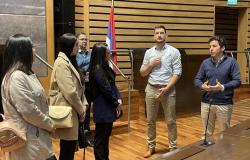The aim is for students to have the basis to “know how to choose what they eat” and at the same time guarantee generational change
LOGROÑO, June 4 (EUROPA PRESS) –
The member of the Executive of the Coordinator of Farmers and Livestock Organizations (COAG), Jaume Bernis, has moved today to Logroño to ask the Rioja Government to “take up the idea” of introducing into teaching the “who, how and where produce food.”
Bernis offered a press conference at the headquarters of the Union of Farmers and Ranchers of La Rioja (UAGR), integrated into the COAG, in which he explained that it is a project that arises from an “analysis” of the books of Primary and Secondary text.
Through it, it was verified that, in them, the primary sector is spoken of in a pejorative way; or stating that it pollutes or mistreats animals.
He has also recognized that farmers and ranchers have dedicated “a lot to working and little to explaining” how they work. However, they would like students “They would leave school knowing who, how and where food is produced.”
It is, Mamen Carrillo, of the Permanent Commission of the UAGR-COAG and responsible for livestock, has completed in this sense, that they have “the basis to know how to choose or be able to choose what they eat.”
“If we start from the fact that food is a fundamental, basic, essential good, I think we can ask ourselves why livestock and agriculture are sectors that are essential and vital, but so unknown,” has considered.
In this regard, the president of the UAGR, Oscar Salazar, has indicated that the primary sector is “essential” because it produces food but also because it “fixes the population in rural areas” and generates employment.
In this way, the COAG initiative also focuses on teaching the environmental role that agriculture has. Thus, Bernis said, “a fact that is said very little” is that the agri-food sector “captures a third of the emissions it produces.”
He added that “education in these age groups is so important to bring rural space closer to urban space” and stop Empty Spain. “We believe this project is also important to guarantee generational change,” he highlighted.






